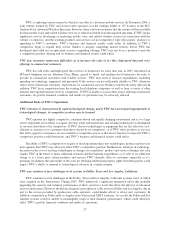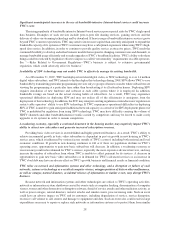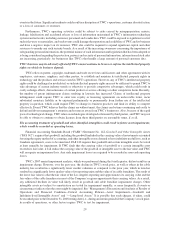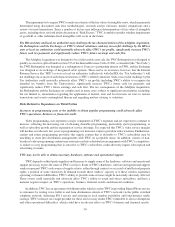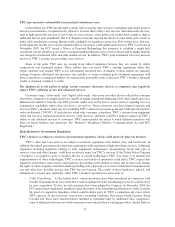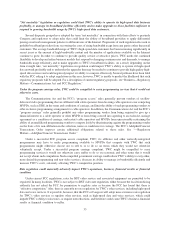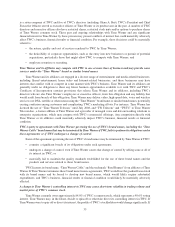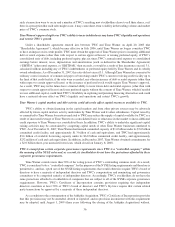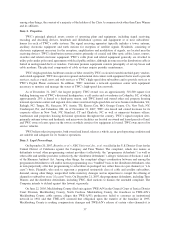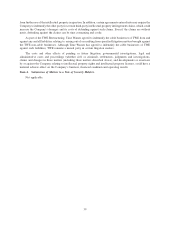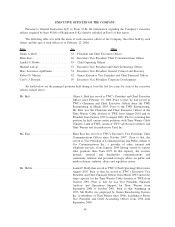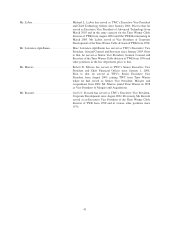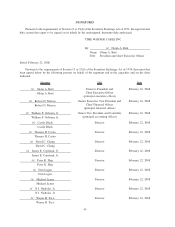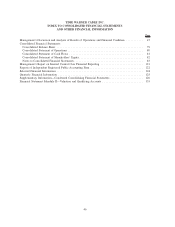Time Warner Cable 2007 Annual Report Download - page 41
Download and view the complete annual report
Please find page 41 of the 2007 Time Warner Cable annual report below. You can navigate through the pages in the report by either clicking on the pages listed below, or by using the keyword search tool below to find specific information within the annual report.such a transaction were to occur and a number of TWC’s resulting new stockholders chose to sell their shares, or if
there is a perception that such sales might occur, it may cause short-term volatility in the trading volume and market
price of TWC’s common stock.
Time Warner’s approval right over TWC’s ability to incur indebtedness may harm TWC’s liquidity and operations
and restrict TWC’s growth.
Under a shareholder agreement entered into between TWC and Time Warner on April 20, 2005 (the
“Shareholder Agreement”), which became effective in July 2006, until Time Warner no longer considers TWC
to have an impact on its credit profile, TWC must obtain the approval of Time Warner prior to incurring additional
debt or rental expense (other than with respect to certain approved leases) or issuing preferred equity, if TWC’s
consolidated ratio of debt, including preferred equity, plus six times TWC’s annual rental expense to consolidated
earnings before interest, taxes, depreciation and amortization (each as defined in the Shareholder Agreement)
(“EBITDA”) plus rental expense, or “EBITDAR,” then exceeds, or would as a result of that incurrence exceed, 3:1,
calculated without including any of TWC’s indebtedness or preferred equity held by Time Warner and its wholly
owned subsidiaries. As of December 31, 2007, this ratio did not exceed 3:1. Although Time Warner has consented to
ordinary course issuances of commercial paper or borrowings under TWC’s current revolving credit facility up to
the limit of that credit facility, if the ratio were exceeded, any other incurrence of debt or rental expense (other than
with respect to certain approved leases) or the issuance of preferred stock would require Time Warner’s approval.
As a result, TWC may in the future have a limited ability to incur future debt and rental expense (other than with
respect to certain approved leases) and issue preferred equity without the consent of Time Warner, which if needed
to raise additional capital, could limit TWC’s flexibility in exploring and pursuing financing alternatives and could
have a material adverse effect on TWC’s liquidity and operations and restrict TWC’s growth.
Time Warner’s capital markets and debt activity could adversely affect capital resources available to TWC.
TWC’s ability to obtain financing in the capital markets and from other private sources may be adversely
affected by future capital markets activity undertaken by Time Warner and its other subsidiaries. Capital raised by
or committed to Time Warner for matters unrelated to TWC may reduce the supply of capital available for TWC as a
result of increased leverage of Time Warner on a consolidated basis or reluctance in the market to incur additional
credit exposure to Time Warner on a consolidated basis. In addition, TWC’s ability to undertake significant capital
raising activities may be constrained by competing capital needs of other Time Warner businesses unrelated to
TWC. As of December 31, 2007, Time Warner had unused committed capacity of $1.0 billion under its $7.0 billion
committed credit facility, and approximately $1.3 billion of cash and equivalents, and TWC had approximately
$3.6 billion of available borrowing capacity under its $6.0 billion committed credit facility, and approximately
$232 million of cash and cash equivalents. In addition, in December 2007, Time Warner obtained commitments for
a $2.0 billion three-year unsecured term loan, which closed on January 8, 2008.
TWC is exempt from certain corporate governance requirements since TWC is a “controlled company” within
the meaning of the NYSE rules and, as a result, its stockholders do not have the protections afforded by these
corporate governance requirements.
Time Warner controls more than 50% of the voting power of TWC’s outstanding common stock. As a result,
TWC is considered to be a “controlled company” for the purposes of the NYSE listing requirements and therefore is
permitted to, and has, opted out of the NYSE listing requirements that would otherwise require TWC’s board of
directors to have a majority of independent directors and TWC’s compensation and nominating and governance
committees to be comprised entirely of independent directors. Accordingly, TWC’s stockholders do not have the
same protections afforded to stockholders of companies that are subject to all of the NYSE corporate governance
requirements. However, TWC’s Certificate of Incorporation contains provisions requiring that independent
directors constitute at least 50% of TWC’s board of directors and TWC’s By-laws require that certain related
party transactions be approved by a majority of these independent directors.
As a condition to the consummation of the Adelphia Acquisition, TWC’s Certificate of Incorporation provides
that this provision may not be amended, altered or repealed, and no provision inconsistent with this requirement
may be adopted, until August 1, 2009 (three years following the closing of the Adelphia Acquisition) without,
36



